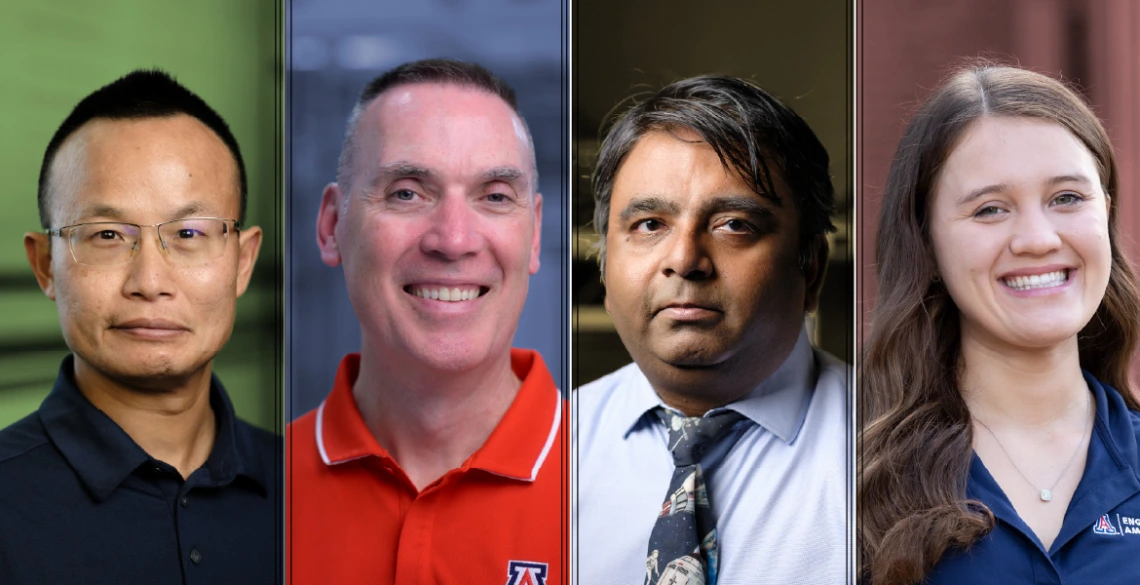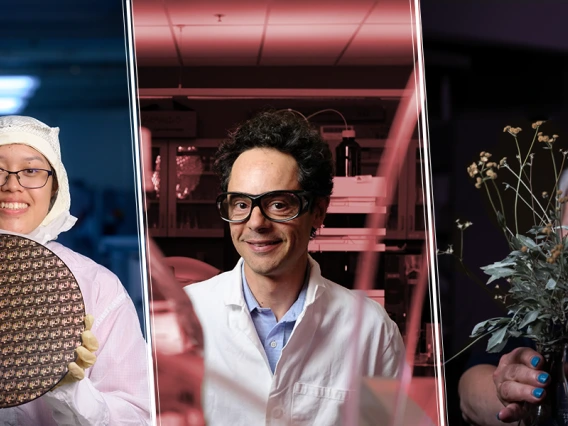Arizona Engineering’s 13 most buzzworthy stories of 2024
A top 10 list can’t cover all the achievements the college’s students, faculty and partners realized in the past year.

College of Engineering leaders make 2024 a year to remember. (Left to right) Yao-Jan Wu, professor of civil and architectural engineering and mechanics and executive director of the Arizona Transportation Institute; Mark Van Dyke, associate dean of research; Jekan Thanga, aerospace and mechanical engineering associate professor; and Katelyn Rees, mechanical engineering and computer science 2024 graduate.
The people of the University of Arizona College of Engineering shattered expectations in 2024 with a host of noteworthy accomplishments. Faculty didn’t just create a U of A program that centers on students’ strengths, they formed a plan to foster lasting change in engineering education nationwide. And students didn’t simply participate in research, they took the lead on newsworthy papers and built lunar astronaut shelters.
Collaborating with alumni, supporters and industry partners, these Engineering standouts broke records and changed lives. They blazed exciting trails in cancer research, furthered climate change and forged pathways to the jobs of the future.
And that’s only a small taste of the year’s highlights. Since 10 wasn’t enough, three bonus stories provide a glimpse of what’s coming from these big thinkers in 2025 and beyond.
Challenging status quos
- Arizona Transportation Institute brings safety, sustainability, economic growth
Making state history, the Arizona Department of Transportation united the three public universities in a research partnership headquartered in U of A Engineering. ADOT will fund up to $11.5 million for high-priority projects that improve all residents’ safety, usher students into transportation careers and help researchers secure federal funding.
- An engineering mindset improves cancer research
The U of A Cancer Engineering Initiative gained ground in pioneering treatments that are personalized for every patient. Newly hired biomedical engineering faculty are collaborating to develop crucial techniques and materials.
- Centering engineering education on student strengths
The eCAMINOS program established support for 50 engineering students in Tucson and Yuma with annual scholarships up to $15,000 apiece and access to strengths-based mentoring and development. And the program, funded with $2.5 million from the National Science Foundation, will create ripples – faculty strive to inspire a widespread shift toward socioeconomic inclusivity in engineering education.
Clever responses to big problems
- Solutions for the looming semiconductor energy crisis
Energy use from semiconductor technology is on course to far outstrip supply. The NSF awarded $3.8 million for two solution-focused projects involving U of A engineers. The interdisciplinary, multi-university efforts draw on college expertise in wireless communication and computer memory systems.
- Machine learning shows promise for safer EV batteries
Overheated electric vehicle batteries can cause fires and endanger drivers. Research led by a doctoral student proposes a potentially lifesaving artificial intelligence framework for predicting and preventing temperature spikes.
- Students help develop smart lunar sandbag shelters
With NASA funding, aerospace and mechanical engineering associate professor Jekan Thanga and his students built robot networks to assemble human housing for the moon. The research team’s sandbag homes – inspired by cathedral termite mounds – reduce the material that must be transported, provide good climate control, and protect astronauts against lunar hazards.
Ready for jobs of the future
- A long-term investment in mining
Thanks to a $2.5 million grant from mining company and longtime supporter Freeport-McMoRan, the college and its partners are expanding K-12 outreach programs and providing mining engineering scholarships. The collaboration “lays the groundwork for long-term success” in an industry that needs qualified workers to sustainably meet increasing demand.
- Latest graduate degrees cater to in-demand skills
The college added postgraduate degrees to its program offerings in computer science and engineering and software engineering to help fill workforce gaps and accelerate careers. Demand for computer science and software engineers is sky-high, with starting salaries of up to $125,000.
Raising the bar
- Four faculty make university’s Women of Impact list
Engineering made an unprecedented show at the 2024 Women of Impact awards. The U of A selected Erika Eggers, Hee-Jeong Kim, Kimberly Ogden and Janet Roveda for their research contributions and demonstrated commitment to the university’s mission. The awardees are leaders in health, sustainability and community-building efforts.
- Marking a historic year in research expenditures
In 2024, research expenditures doubled in comparison to 2018 levels. The college has created a culture in which colleagues support one another to go after big grants, according to Craig M. Berge Dean David W. Hahn. With these awards, faculty are attracting major partners, bolstering the economy and engaging students.
The bonus three: much more to come
- Engineering supporters fuel wonder
Alumni and friends gathered to celebrate the Engineering launch of the Fuel Wonder fundraising campaign. Katelyn Rees, who served as a student regent for the Arizona Board of Regents before graduating in May, thanked donors for giving her “the support and resources to thrive.”
- Climate change insights are in the clouds
Sylvia Sullivan, assistant professor of chemical and environmental engineering, is developing a tool to better measure ice cloud data with a $4.5 million NASA grant. The instrument is planned to increase the certainty of climate models that rely on clouds, which can either raise or lower atmospheric temperatures.
- 6G is coming, and security is a priority
The Center for Wireless Innovation towards Secure, Pervasive, Efficient, and Resilient Next G Networks – or WISPER – puts the college at the forefront of the evolving needs for 6G communication. Working with industry and academic partners, researchers will test creative security solutions and methods for supporting the higher frequencies of today’s technology.


